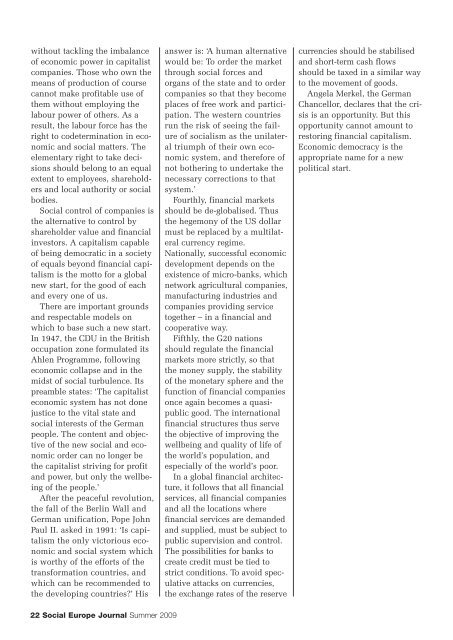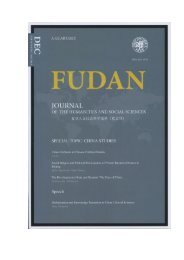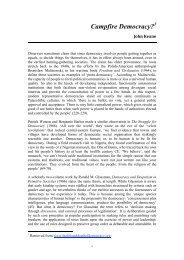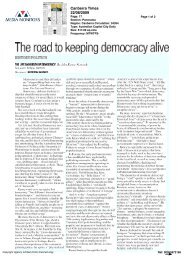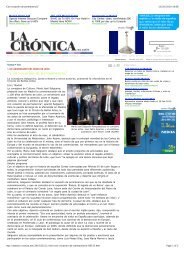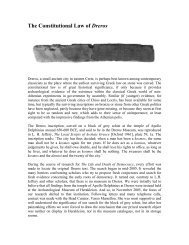The Ethics of Capitalism - Social Europe Journal
The Ethics of Capitalism - Social Europe Journal
The Ethics of Capitalism - Social Europe Journal
You also want an ePaper? Increase the reach of your titles
YUMPU automatically turns print PDFs into web optimized ePapers that Google loves.
without tackling the imbalance<br />
<strong>of</strong> economic power in capitalist<br />
companies. Those who own the<br />
means <strong>of</strong> production <strong>of</strong> course<br />
cannot make pr<strong>of</strong>itable use <strong>of</strong><br />
them without employing the<br />
labour power <strong>of</strong> others. As a<br />
result, the labour force has the<br />
right to codetermination in economic<br />
and social matters. <strong>The</strong><br />
elementary right to take decisions<br />
should belong to an equal<br />
extent to employees, shareholders<br />
and local authority or social<br />
bodies.<br />
<strong>Social</strong> control <strong>of</strong> companies is<br />
the alternative to control by<br />
shareholder value and financial<br />
investors. A capitalism capable<br />
<strong>of</strong> being democratic in a society<br />
<strong>of</strong> equals beyond financial capitalism<br />
is the motto for a global<br />
new start, for the good <strong>of</strong> each<br />
and every one <strong>of</strong> us.<br />
<strong>The</strong>re are important grounds<br />
and respectable models on<br />
which to base such a new start.<br />
In 1947, the CDU in the British<br />
occupation zone formulated its<br />
Ahlen Programme, following<br />
economic collapse and in the<br />
midst <strong>of</strong> social turbulence. Its<br />
preamble states: ‘<strong>The</strong> capitalist<br />
economic system has not done<br />
justice to the vital state and<br />
social interests <strong>of</strong> the German<br />
people. <strong>The</strong> content and objective<br />
<strong>of</strong> the new social and economic<br />
order can no longer be<br />
the capitalist striving for pr<strong>of</strong>it<br />
and power, but only the wellbeing<br />
<strong>of</strong> the people.’<br />
After the peaceful revolution,<br />
the fall <strong>of</strong> the Berlin Wall and<br />
German unification, Pope John<br />
Paul II. asked in 1991: ‘Is capitalism<br />
the only victorious economic<br />
and social system which<br />
is worthy <strong>of</strong> the efforts <strong>of</strong> the<br />
transformation countries, and<br />
which can be recommended to<br />
the developing countries’ His<br />
answer is: ‘A human alternative<br />
would be: To order the market<br />
through social forces and<br />
organs <strong>of</strong> the state and to order<br />
companies so that they become<br />
places <strong>of</strong> free work and participation.<br />
<strong>The</strong> western countries<br />
run the risk <strong>of</strong> seeing the failure<br />
<strong>of</strong> socialism as the unilateral<br />
triumph <strong>of</strong> their own economic<br />
system, and therefore <strong>of</strong><br />
not bothering to undertake the<br />
necessary corrections to that<br />
system.’<br />
Fourthly, financial markets<br />
should be de-globalised. Thus<br />
the hegemony <strong>of</strong> the US dollar<br />
must be replaced by a multilateral<br />
currency regime.<br />
Nationally, successful economic<br />
development depends on the<br />
existence <strong>of</strong> micro-banks, which<br />
network agricultural companies,<br />
manufacturing industries and<br />
companies providing service<br />
together – in a financial and<br />
cooperative way.<br />
Fifthly, the G20 nations<br />
should regulate the financial<br />
markets more strictly, so that<br />
the money supply, the stability<br />
<strong>of</strong> the monetary sphere and the<br />
function <strong>of</strong> financial companies<br />
once again becomes a quasipublic<br />
good. <strong>The</strong> international<br />
financial structures thus serve<br />
the objective <strong>of</strong> improving the<br />
wellbeing and quality <strong>of</strong> life <strong>of</strong><br />
the world’s population, and<br />
especially <strong>of</strong> the world’s poor.<br />
In a global financial architecture,<br />
it follows that all financial<br />
services, all financial companies<br />
and all the locations where<br />
financial services are demanded<br />
and supplied, must be subject to<br />
public supervision and control.<br />
<strong>The</strong> possibilities for banks to<br />
create credit must be tied to<br />
strict conditions. To avoid speculative<br />
attacks on currencies,<br />
the exchange rates <strong>of</strong> the reserve<br />
currencies should be stabilised<br />
and short-term cash flows<br />
should be taxed in a similar way<br />
to the movement <strong>of</strong> goods.<br />
Angela Merkel, the German<br />
Chancellor, declares that the crisis<br />
is an opportunity. But this<br />
opportunity cannot amount to<br />
restoring financial capitalism.<br />
Economic democracy is the<br />
appropriate name for a new<br />
political start.<br />
22 <strong>Social</strong> <strong>Europe</strong> <strong>Journal</strong> Summer 2009


